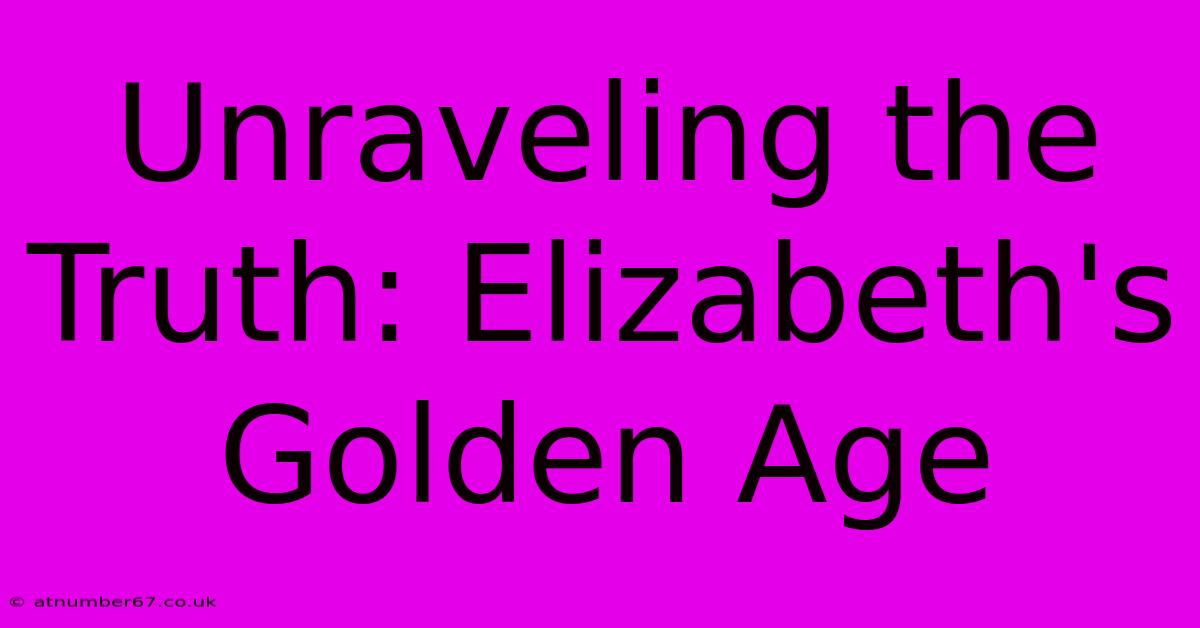Unraveling The Truth: Elizabeth's Golden Age

Table of Contents
Unraveling the Truth: Elizabeth I's Golden Age
The reign of Queen Elizabeth I (1533-1603) is often romanticized as a "Golden Age," a period of unprecedented prosperity, cultural flourishing, and national strength for England. But how accurate is this glittering image? This article delves into the realities of Elizabethan England, examining both the undeniable achievements and the often-overlooked complexities of this fascinating era.
The Myth of the Golden Age: A Closer Look
The term "Golden Age" itself is a retrospective label, applied long after Elizabeth's death. While the period certainly witnessed significant advancements, it's crucial to avoid a simplistic, overly positive narrative. Poverty, social inequality, and religious tensions were rampant realities alongside the apparent glory. The glittering façade often concealed deep-seated social and economic problems.
Economic Prosperity: Fact and Fiction
While England experienced a period of relative economic expansion during Elizabeth's reign, this wasn't evenly distributed. The burgeoning merchant class prospered greatly, fueled by exploration, trade (particularly with the New World), and the growth of London as a major commercial hub. However, the vast majority of the population remained impoverished, reliant on agriculture and vulnerable to crop failures and disease. The enclosure movement, which privatized common lands, further exacerbated rural poverty and social unrest.
Cultural Flourishing: Shakespeare and Beyond
Undeniably, Elizabethan England witnessed a remarkable flowering of arts and culture. William Shakespeare's plays, along with the works of countless other playwrights, poets, and composers, continue to resonate today. This creative explosion was partly fueled by the growing wealth and patronage of the aristocracy, but also reflected a wider societal shift towards humanism and a renewed interest in classical learning. However, access to these cultural riches was largely limited to the elite. The vast majority of the population remained illiterate and excluded from the intellectual and artistic ferment of the time.
National Strength and Foreign Policy
Elizabeth's reign saw England emerge as a significant European power. Her shrewd diplomacy and military victories, particularly against the Spanish Armada in 1588, solidified England's position on the world stage. However, this strength was built on a foundation of precarious alliances and ongoing conflicts. The constant threat of invasion and religious turmoil meant that peace and security were far from guaranteed. The empire's expansion, while economically beneficial for some, also came at the cost of exploitation and colonization.
The Darker Side of the Golden Age
Beyond the glittering façade, Elizabethan England was also marked by harsh realities:
- Religious Persecution: While Elizabeth established a relatively tolerant Anglican Church, religious dissenters faced persecution and execution. Catholics and Puritans alike suffered under the weight of the state's religious policy.
- Social Inequality: The gap between the rich and the poor was vast, leading to widespread poverty, crime, and social unrest. Beggary and vagrancy were pervasive problems.
- Colonialism and Exploitation: England's growing empire relied heavily on the exploitation of resources and people in its colonies. The transatlantic slave trade began to gain momentum during this period, laying the foundation for centuries of injustice.
Reassessing the "Golden Age"
Elizabeth I's reign was undoubtedly a period of significant transformation and achievement for England. However, the narrative of a uniformly "Golden Age" needs careful scrutiny. By acknowledging the complexities and contradictions of the era – the poverty alongside the prosperity, the cultural flourishing alongside the social injustices – we can gain a more nuanced and accurate understanding of this pivotal moment in English history. The "Golden Age" was, in reality, a multifaceted and often paradoxical period, shaped by both progress and profound inequalities. Only through careful examination can we truly unravel the truth behind this iconic era.

Thank you for visiting our website wich cover about Unraveling The Truth: Elizabeth's Golden Age. We hope the information provided has been useful to you. Feel free to contact us if you have any questions or need further assistance. See you next time and dont miss to bookmark.
Featured Posts
-
Seventh Son Full Movie Fantasy Fun For All
Apr 05, 2025
-
Sophie Rain Only Fans How To Achieve Similar Success
Apr 05, 2025
-
Who Is Crystal Donna Roberts Son
Apr 05, 2025
-
Que Son Las Coplas And How To Appreciate Them
Apr 05, 2025
-
Herb Dean A Referees Path To Financial Freedom
Apr 05, 2025
